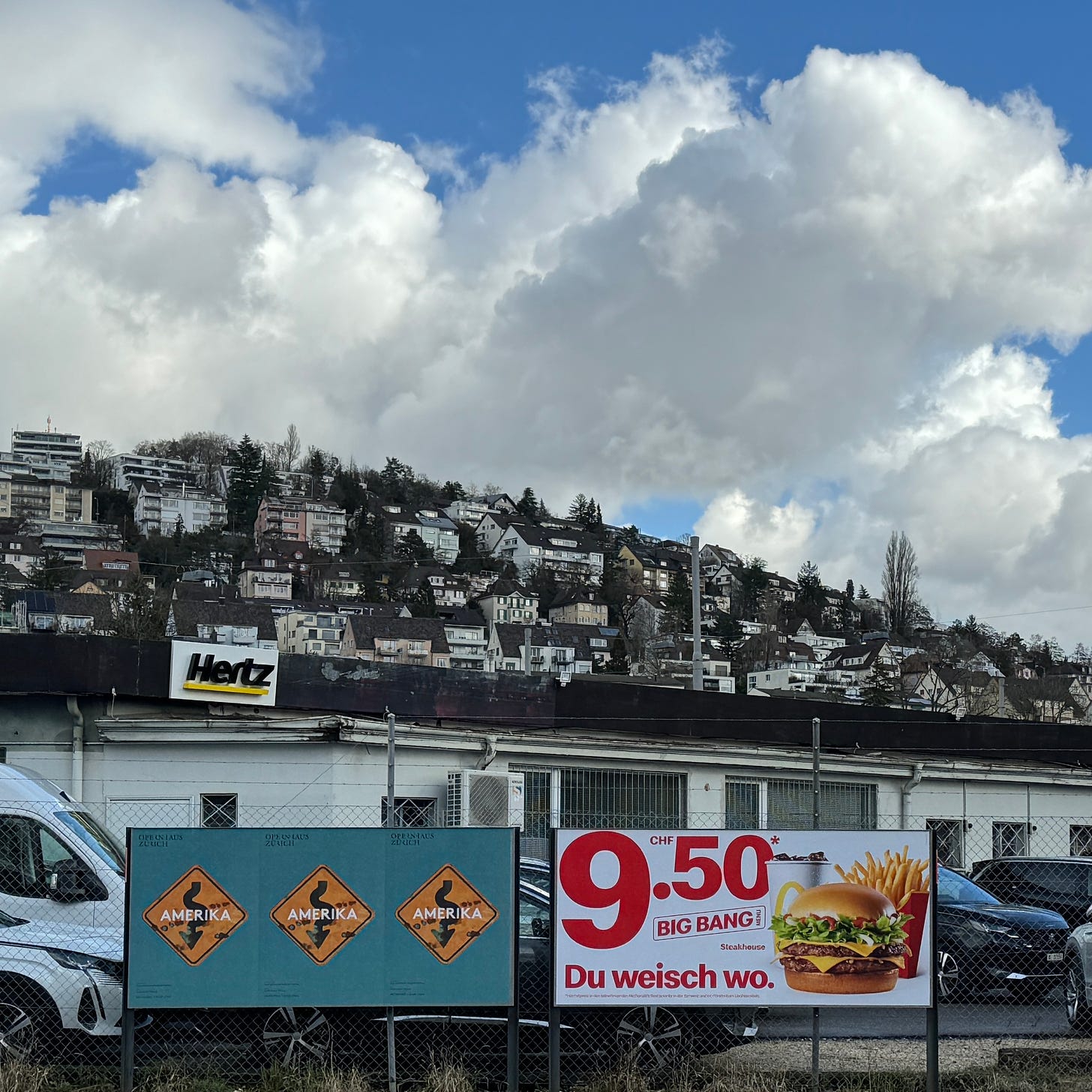Relative to your interests
Cluetrain at 25 - This was an important book to me when it came out. It probably had a huge influence on my professional life. All these years later, I think it was right. The biggest evolution, unexpected, was that the Big Bad Corporate Octopus took it seriously and figured out how to monetize the shit out the Cluetrain. Toot! Toot!
How to Stay Grounded Through Organizational Chaos - There’s a lot of good advice here, but the most important is here: “If your organization’s approach raises concerns or if you find yourself constantly questioning its strategies, it’s worth considering whether you’re in the right place. While “pretending that certainty exists is delusional,” it’s possible to find an organization that’s more aligned with your values, and where work feels less like a constant whiplash.” // The toolkit to examine if your company has a good strategy, operations/execution, and the stability needed to function…that toolkit is hard to assemble, use, and trust. // Also, I’ve become leery of the “the only thing you can control is yourself.” This is an easy mindset for a Roman emperor to have, and equally easy if you live in a big-ass clay jar with no other responsibilities or possession in life. But in the middle of those polls, the problem starts to be more than just your mental vibes, and getting to inward looking detracts from fixing the overall system.
What is a long context window? Google DeepMind engineers explain - “Previously, Gemini could process up to 32,000 tokens at once, but 1.5 Pro — the first 1.5 model we’re releasing for early testing — has a context window of up to 1 million tokens — the longest context window of any large-scale foundation model to date. In fact, we’ve even successfully tested up to 10 million tokens in our research. And the longer the context window, the more text, images, audio, code or video a model can take in and process.” // Once they allow uploading multiple files (in the EU, where I live), that will be something. There’s only so many tokens you can cut and last into a web browser field (literally, they cut it off!).
Tanzu Spring Runtime: Empowering Developers for Tomorrow’s Challenges - If you’re using Java apps to run your business, you should get this integrated stack instead of worrying about doing all the DIY work to take care of and update and secure that stack itself. Also, it means you’ll have support and training.
Addressing cloud waste: 4 steps to cloud computing cost optimization - “Organizations with little or no cloud cost optimization plans rush into cloud technology investments,” according to Gartner. “They end up overspending on cloud services by up to 70 percent without deriving the expected value from it.”
9 Things You Need to Know About the Threads Algorithm - Getting the juice. As ever, fucking around in the comments seems to help.
AI Companies Lose $190 Billion After Dismal Financial Reports - When share prices drop that much, it means that money was never there in the first place and was just made up fantasy-land shit. Nothing was lost if nothing was there.p
How I’d use generative AI to modernize an app - As it says
Kmart October 1989 : Tape-A-Thon - A pile of tapes of the in-store music is available. Amazing! Here’s an overview of it.
Giving Fifty Percent - “perhaps a lot of the extra effort we thing we’re putting into a task is actually comprised of anxiety and stress and maybe we could just relax and get the same thing done to the same level in roughly the same time, and be happier about it.” // This is one - accurate! - way of looking at the mysterious part of the creative process, whether programming, writing, whatever. The actual activity - typing, painting, cooking - is a small part of the overall, uh, “value stream” needed to create. When you ignore the value of all that other stuff, you damage the whole process. We’re just starting to understand this in enterprise software development: you have to pay attention to the entire span of time between an idea and a person using your app. It’s even more so in non-programming creativity. Taking a walk and seeming to “do nothing” is literally part of the process and if you remove it, you degrade the “business value” of the “business outcome.” There’s some more musing on this in this week’s Software Defined Talk - subscribe, mofos!
Quick Riff on Narrative Strategy - “Narratives as worlds. Consultant as world-runner.” // There’s something important here for marketing people: a lot of marketing work is actually the company figuring out it’s own narrative, studying what products it does, what customers it has, those customer’s jobs to be done, even how sales is done. “Strategy” is supposed to do a lot of that, as is product management. But at most tech companies I’ve worked at, marketing ends up being where that all comes together and becomes…legible? This can be very good, but it can also be very dangerous. Customers don’t really care shout your inner looking narrative; they don’t want to read summaries of your therapy sessions. They just want to know why they would give you money, how and why your product/service will solve their problem without costing more that it should. Investors want to read the transcripts of your therapy sessions, sure, but “the market does not.” If your find that your marketing is spending a lot of time on story telling, and not much on product, you should be very careful.
Related: in tech marketing, customers don’t care how hard it was for you to make the product. Just tell them how it’ll solve their program and that the pricing isn’t a rip-off or enterprise-gouging.
Fight Between Employees, Managers Over Return-to-Office Is Getting Messy - He’s not a fan of remote work. And, really, what worker is?
Wastebook
“sales inflictment.” Here.
“Hastily made hobo-porn.” Here.
“Woke up very confused at how my brain functions, but very excited for dream Margot Robbie’s financial future.” Here.
Move “having made something” to “making something.” - finishing something is just part of the larger joy of making something. It’s in the cycle of creation, feedback, and improvement that you find the real work. Savor the meal, but remember, the best part is knowing you’ll get to cook again soon.
“I now understand that tote bags are bumper stickers for pedestrians” Here.
Conferences, Events, etc.
Talks I’m giving, places I’ll be, and other plans.
Executive dinner on Java Security, March 13th, Dallas; DevOpsDays LA, March 15th, Pasadena “We Fear Change” talk; KubeCon EU, March 19th, Paris; Tanzu (Re)defined, April 11th, Palo Alto.
Come to our little party at KubeCon EU, it’s Thursday night. Register for free here! And, if you’re going to KubeCon EU and haven’t registered yet, you can get 20% off with the code KCEU24VMWBC20.
Logoff
I forget if I’ve actually written this, or wrote it and deleted it from here… I’ve been thinking much recently about what exactly it is I do: do I still enjoy it? Is it still relevant? To put in a dangerous way: do I like my job?
My focus for almost ten years has been “how large companies get better and building and running software” (hence my easy alignment to Pivotal - “transforming how the world builds software” and then getting all butt-hurt about Kubernetes destroying all of that). And what are the results? It’s easy to say not much, but I think I just get used to the new normal. I talked with a gaggle of C-types this week on the getting better at software topic and it was both well received and fun for me. There is still a tremendous amount of interest in the topic…because large organizations have a lot of “transformation” ahead of them still.
Still, what am I doing here? I want desperately to avoid being that old thought-leader that just says the same old thing over and over, for years. After awhile, it causes a “no thoughts found” Ker-chunking in my brain. Also, it’s so boring.
It’s easy to say (to myself, as I often do) that what I should do is re-learn Java and Spring and go down the stack some. There’d be so much interesting to learn and talk with people about when it comes to using AI in big companies. All of that “secure software supply chain” thinking and stuff applies to AI - it’s just more apps, tons of regulated data flying around…but it’s actually very close to “the business.” Talking about AI is a bigger, even more important field than talking about (or caring about!) Kubernetes, Cloud Foundry, even Java itself.
There’s also been a severe reduction in the amount of business travel I do. Obviously since COVID, but also because of the more cost conscience state of my work and strategy fluidity over the past few years. It’s made me realize how many of my friends are road-friends. I don’t mean this in that “self-care” way of being dismissive about friends you make at work. I think that’s utter bullshit: friends are friends.
So, you know: what am I doing here?

